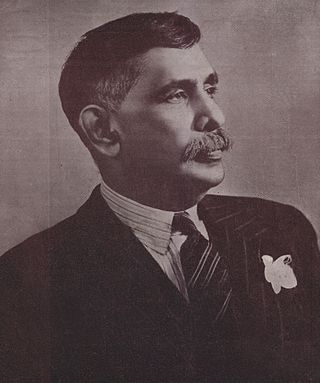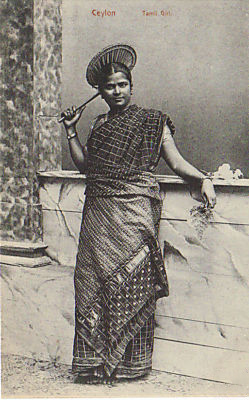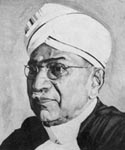
The history of Sri Lanka is unique because the relevance and richness of it extends beyond the areas of South Asia, Southeast Asia and the Indian Ocean. The early human remains which were found on the island of Sri Lanka date back to about 38,000 years ago.

Don Stephen Senanayake was a Ceylonese statesman. He was the first Prime Minister of Ceylon having emerged as the leader of the Sri Lankan independence movement that led to the establishment of self-rule in Ceylon. He is considered as the "Father of the Nation".

The Sri Lankan independence movement was a peaceful political movement which was aimed at achieving independence and self-rule for the country of Sri Lanka, then British Ceylon, from the British Empire. The switch of powers was generally known as peaceful transfer of power from the British administration to Ceylon representatives, a phrase that implies considerable continuity with a colonial era that lasted 400 years. It was initiated around the turn of the 20th century and led mostly by the educated middle class. It succeeded when, on 4 February 1948, Ceylon was granted independence as the Dominion of Ceylon. Dominion status within the British Commonwealth was retained for the next 24 years until 22 May 1972 when it became a republic and was renamed the Republic of Sri Lanka.
The Youth Leagues were societies of young people, mainly intellectuals, who wanted independence for Sri Lanka.

Sri Lankan Tamils, also known as Ceylon Tamils or Eelam Tamils, are Tamils native to the South Asian island state of Sri Lanka. Today, they constitute a majority in the Northern Province, form the plurality in the Eastern Province and are in the minority throughout the rest of the country. 70% of Sri Lankan Tamils in Sri Lanka live in the Northern and Eastern provinces.
The Donoughmore Commission (DC) was responsible for the creation of the Donoughmore Constitution in effect between 1931 and 1947 in Ceylon. In 1931 there were approximately 12% Ceylonese Tamils, 12% Indian Tamils, 65% Sinhalese, and ~3% Ceylon Moors. The British government had introduced a form of communal representation which a strong Tamil representation, out of proportion to the population of the Tamil community. The Sinhalese had been divided into up-country and low-country Sinhalese.

Ganapathipillai Gangaser Ponnambalam was a Ceylon Tamil lawyer, politician and cabinet minister. He was the founder and leader of the All Ceylon Tamil Congress (ACTC), the first political party to represent the Ceylon Tamils.

Samuel James Veluppillai Chelvanayakam was a Ceylonese lawyer, politician and Member of Parliament. He was the founder and leader of the Illankai Tamil Arasu Kachchi (ITAK) and Tamil United Liberation Front (TULF) and a political leader of the Ceylon Tamil community for more than two decades. Chelvanayakam has been described as a father figure to Ceylon's Tamils, to whom he was known as "Thanthai Chelva".

Vettivelu Yogeswaran was a Sri Lankan Tamil lawyer, politician and Member of Parliament.
The origins of the Sri Lankan Civil War lie in the continuous political rancor between the majority Sinhalese and the minority Sri Lankan Tamils. According to Jonathan Spencer, a social anthropologist from the School of Social and Political Studies of the University of Edinburgh, the war is an outcome of how modern ethnic identities have been made and re-made since the colonial period, with the political struggle between minority Tamils and the Sinhalese-dominant government accompanied by rhetorical wars over archeological sites and place name etymologies, and the political use of the national past.

Tamil Eelam is a proposed independent state that many Tamils in Sri Lanka and the Eelam Tamil diaspora aspire to create in the north and east of Sri Lanka. Large sections of the North-East were under de facto control of the Liberation Tigers of Tamil Eelam (LTTE) for most of the 1990s–2000s during the Sri Lankan Civil War. Tamil Eelam, although encompassing the traditional homelands of Eelam Tamils, does not have official status or recognition by world states. The name is derived from the ancient Tamil name for Sri Lanka, Eelam.
Tellippalai or Thellippalai also known as Tillypalli (தில்லைப்பள்ளி) is a small town in the northern Jaffna District of Sri Lanka. It is located about 15 kilometers north of Jaffna town along the Kankesanthurai road
Sri Lankan Tamil nationalism is the conviction of the Sri Lankan Tamil people, a minority ethnic group in the South Asian island country of Sri Lanka, that they have the right to constitute an independent or autonomous political community. This idea has not always existed. Sri Lankan Tamil national awareness began during the era of British rule during the nineteenth century, as Tamil Hindu revivalists tried to counter Protestant missionary activity. The revivalists, led by Arumuga Navalar, used literacy as a tool to spread Hinduism and its principles.

Arunachalam Mahadeva, KCMG was a Ceylon Tamil lawyer, politician and diplomat. He served as Minister of Home Affairs (1942-1946) and High Commissioner to India (1948-1949).

The British Ceylon period is the history of Sri Lanka between 1815 and 1948. It follows the fall of the Kandyan Kingdom into the hands of the British Empire. It ended over 2300 years of Sinhalese monarchy rule on the island. The British rule on the island lasted until 1948 when the country regained independence following the Sri Lankan independence movement.

Chellappah Suntharalingam was a Ceylon Tamil academic, politician, Member of Parliament and government minister.

Sir Waithilingam Duraiswamy was a Ceylon Tamil lawyer, politician and speaker of the State Council of Ceylon.
Santasilan Kadirgamar was a Sri Lankan Tamil academic, historian and author.
Emmanuel Rasanayagam Tambimuttu was a Ceylon Tamil lawyer, politician and member of the Legislative Council of Ceylon and State Council of Ceylon.
John Gladstone Rajakulendran was a Ceylon Tamil politician and teacher.










